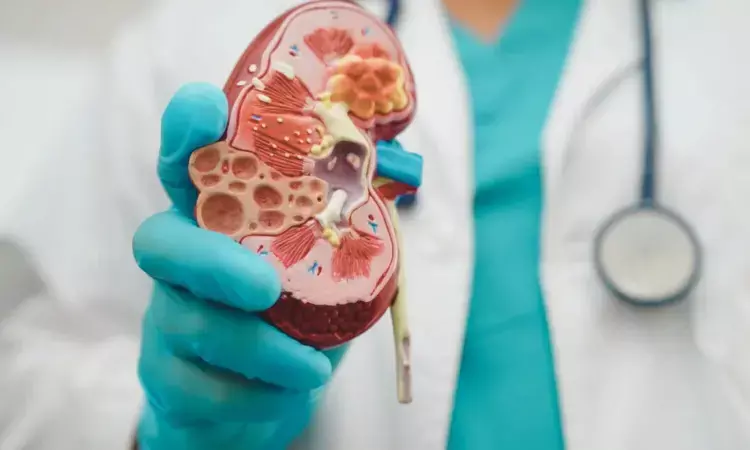- Home
- Medical news & Guidelines
- Anesthesiology
- Cardiology and CTVS
- Critical Care
- Dentistry
- Dermatology
- Diabetes and Endocrinology
- ENT
- Gastroenterology
- Medicine
- Nephrology
- Neurology
- Obstretics-Gynaecology
- Oncology
- Ophthalmology
- Orthopaedics
- Pediatrics-Neonatology
- Psychiatry
- Pulmonology
- Radiology
- Surgery
- Urology
- Laboratory Medicine
- Diet
- Nursing
- Paramedical
- Physiotherapy
- Health news
- Fact Check
- Bone Health Fact Check
- Brain Health Fact Check
- Cancer Related Fact Check
- Child Care Fact Check
- Dental and oral health fact check
- Diabetes and metabolic health fact check
- Diet and Nutrition Fact Check
- Eye and ENT Care Fact Check
- Fitness fact check
- Gut health fact check
- Heart health fact check
- Kidney health fact check
- Medical education fact check
- Men's health fact check
- Respiratory fact check
- Skin and hair care fact check
- Vaccine and Immunization fact check
- Women's health fact check
- AYUSH
- State News
- Andaman and Nicobar Islands
- Andhra Pradesh
- Arunachal Pradesh
- Assam
- Bihar
- Chandigarh
- Chattisgarh
- Dadra and Nagar Haveli
- Daman and Diu
- Delhi
- Goa
- Gujarat
- Haryana
- Himachal Pradesh
- Jammu & Kashmir
- Jharkhand
- Karnataka
- Kerala
- Ladakh
- Lakshadweep
- Madhya Pradesh
- Maharashtra
- Manipur
- Meghalaya
- Mizoram
- Nagaland
- Odisha
- Puducherry
- Punjab
- Rajasthan
- Sikkim
- Tamil Nadu
- Telangana
- Tripura
- Uttar Pradesh
- Uttrakhand
- West Bengal
- Medical Education
- Industry
Elevated cathepsin S levels linked to increased IgAN risk, reveals research

China: Higher levels of cathepsin S (CTSS) may be linked to an increased risk of IgA nephropathy (IgAN), a recent study has found.
The findings, published in Frontiers in Immunology, indicate a marked upregulation of CTSS in both serum and renal tissues of patients with IgAN, suggesting that CTSS could be a valuable diagnostic and prognostic biomarker, as well as a promising target for developing effective therapies for IgAN.
IgA nephropathy is a prevalent form of glomerulonephritis globally that exhibits complex pathogenesis. Cathepsins, cysteine proteases within lysosomes, are implicated in various pathological and physiological processes, including renal conditions. Previous observational studies have indicated a potential link between cathepsins and IgAN, yet there is no clarity on the precise causal relationship.
Against the above background, Shaojie Fu, Department of Nephrology, The First Hospital of Jilin University, Changchun, China, and colleagues aimed to systematically explore the causal association between cathepsins and IgAN by conducting a comprehensive bidirectional and multivariable Mendelian randomization (MR) study using publicly available genetic data.
Enzyme-linked immunosorbent assay (ELISA) and immunohistochemical (IHC) staining were employed to evaluate cathepsin expression levels in renal tissues and serum of IgAN patients. They investigated the underlying mechanisms via gene set variation analysis (GSVA), immune cell infiltration analysis, and gene set enrichment analysis (GSEA). Additionally, virtual screening and molecular docking were performed to identify potential drug candidates through drug repositioning.
The study led to the following findings:
- Univariate MR analyses demonstrated a significant link between increased CTSS levels and a heightened risk of IgAN. This was evidenced by an odds ratio (OR) of 1.041, estimated using the inverse variance weighting (IVW) method.
- In multivariable MR analysis, even after adjusting for other cathepsins, elevated CTSS levels showed a strong correlation with an increased risk of IgAN (IVW P=0.020, OR=1.037).
- Reverse MR analyses did not establish a causal relationship between IgAN and various cathepsins.
- IHC and ELISA findings revealed significant overexpression of CTSS in both renal tissues and serum of IgAN patients compared to controls, and this high expression was unique to IgAN compared with several other primary kidney diseases such as membranous nephropathy, minimal change disease, and focal segmental glomerulosclerosis.
- Investigations into immune cell infiltration, GSEA, and GSVA showed the role of CTSS expression in the immune dysregulation observed in IgAN.
- Molecular docking and virtual screening highlighted Camostat mesylate, c-Kit-IN-1, and Mocetinostat as the top drug candidates for targeting CTSS.
The study revealed convincing evidence linking increased CTSS levels with an increased IgAN risk.
"We noted a significant CTSS upregulation in both the serum and renal tissues of IgAN patients. These findings could prove invaluable as markers for the IgAN diagnosis and prognosis. Furthermore, our exploration into inhibitors targeting CTSS could be a promising pathway for developing effective IgAN treatments," the researchers concluded.
Reference:
Fu, S., Wu, M., Cheng, Y., Guan, Y., Yu, J., Wang, X., Su, S., Wu, H., Ma, F., Zou, Y., Wu, S., Xu, H., & Xu, Z. (2024). Cathepsin S (CTSS) in IgA nephropathy: An exploratory study on its role as a potential diagnostic biomarker and therapeutic target. Frontiers in Immunology, 15, 1390821. https://doi.org/10.3389/fimmu.2024.1390821
Dr Kamal Kant Kohli-MBBS, DTCD- a chest specialist with more than 30 years of practice and a flair for writing clinical articles, Dr Kamal Kant Kohli joined Medical Dialogues as a Chief Editor of Medical News. Besides writing articles, as an editor, he proofreads and verifies all the medical content published on Medical Dialogues including those coming from journals, studies,medical conferences,guidelines etc. Email: drkohli@medicaldialogues.in. Contact no. 011-43720751


